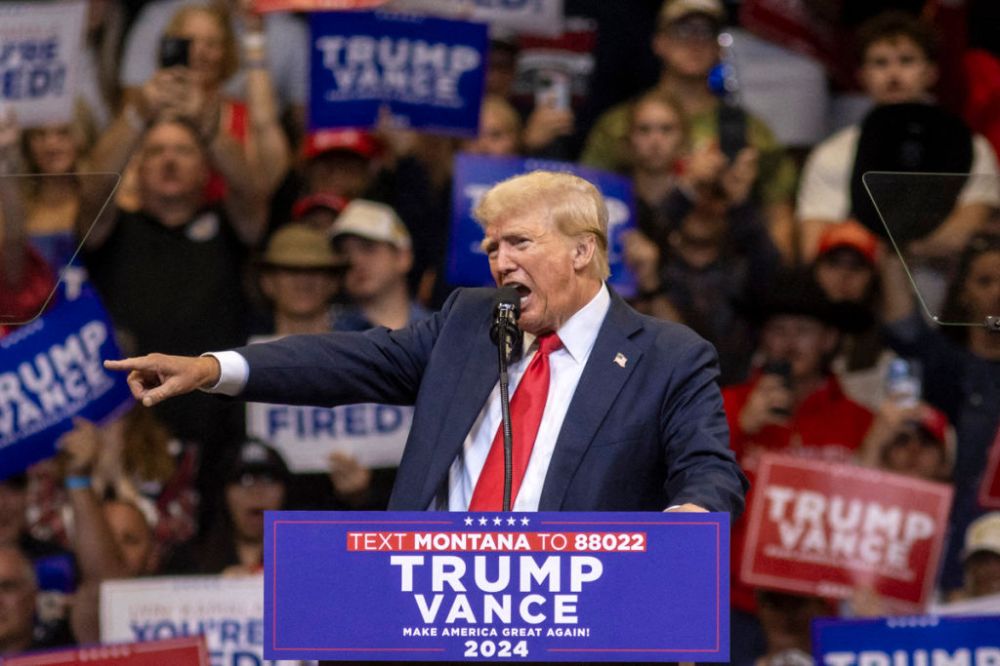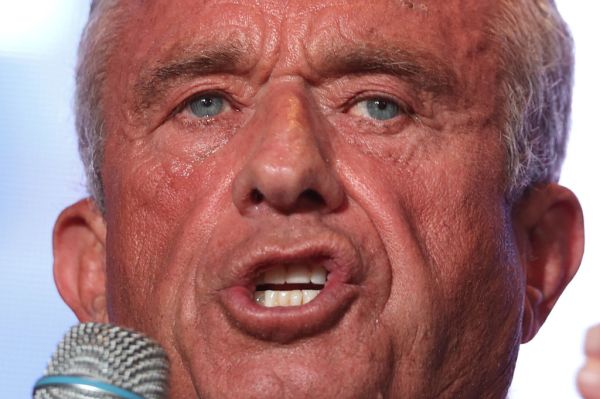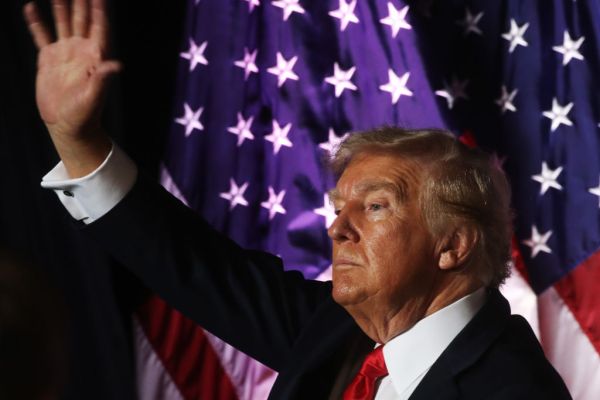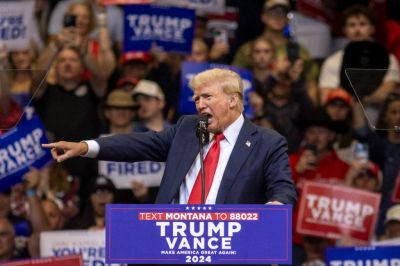For the second time in this campaign, a party won’t face the fact that there’s something seriously wrong with its nominee for president.
And not just the party. His detractors are guilty of it too.
Critics like me routinely insist that Donald Trump is crazy, yet we seldom treat that as the most compelling reason to oppose his candidacy. How many times, for instance, have I complained about his nationalist policies or authoritarian politics relative to his obviously deepening psychological fragility?
I thought of that this weekend when an argument broke out among conservatives over David French’s case for supporting Kamala Harris. Lost in the debate over which candidate’s agenda would be slightly more Reaganite than the other’s or whether the culture of the GOP would improve after a Trump defeat is this momentous yet almost too-basic-to-ask question: Is Trump in touch with reality?
My own argument for supporting Harris—that she’s the only one of the two who hasn’t attempted a coup—also somehow overlooks the threshold matter of why we would trust the world’s most important job to someone who’s plainly more unbalanced today than he was in 2016 or 2020.
It’s understandable that pundits would have this blind spot. We know more about policy and politics than about psychology, so that’s the ground we fight on. I can tell you why Trump’s pro-tariff, anti-immigration program would be inflationary or why stocking the executive branch with cultish MAGA loyalists would threaten the constitutional order. But I can’t diagnose the peculiar habits of thinking that make him who he is.
And the hard truth is that after nine years, those peculiar habits seem less peculiar than they once did. The idea of America being led by a person as psychologically frail as Trump has been normalized. We’re all frogs in a pot that’s been slowly brought to a boil.
But we should pay more attention to the fact that something is wrong with him. And I think we will, including millions of Republicans who are no more eager to face the truth about their nominee than Democrats were to face the truth about Joe Biden. We’ll have no choice: With Harris suddenly ahead in polling, in fundraising, and in enthusiasm, Trump’s confidence in his own popularity is being tested more severely than at any point since the aftermath of the 2020 election.
He couldn’t cope then and he’s not coping well now. The more the race gets away from him, the more obvious his fragility will become.
Reasoning and unreason.
The silliest spectacle in politics this month has been Republicans pleading with Trump to get back on message, as if he’s somehow forgotten that inflation and immigration are his strongest lines of attack against Harris.
He didn’t forget. And he assuredly does want to win. He’s off-message because he can’t help himself. There’s something wrong with him.
The New York Times reported this weekend on a dinner he held with wealthy donors in New York on August 2. “Some guests hoped Mr. Trump would signal that he was recalibrating after a series of damaging mistakes,” the paper noted. Instead he babbled about stolen elections, repeated his “black or Indian?” critique of Harris, and assured the crowd that he’s “not nicer” following the attempt on his life last month that had supposedly left him a changed man.
One attendee told the New York Post’s Charles Gasparino that when a donor advised him to tone down some of his attacks, Trump replied, “They tried to put me in jail; they tried to ruin my reputation and then they tried to assassinate me. At some point, you have [to] be truthful to yourself.”
Being true to himself is the whole problem. His advisers are “deeply rattled by his meandering, mean and often middling public performances since the failed assassination attempt,” per Axios. One source claimed that Trump “is struggling to get past his anger,” the sort of thing one might say about a temperamental child (no wonder), not the nominee of a major party fewer than 100 days out from an election.
Trump being undisciplined and self-indulgent isn’t news, though, any more than him resorting to childish cruelty toward his enemies is. What’s newsy is how his anxiety about Harris’ surging popularity has led him into outright fantasy to try to explain it.
Last week she was received by a huge crowd at the airport in Detroit when Air Force Two touched down. Reporters were there, including those from the Times and Washington Post, and numerous attendees posted video of her arrival on social media. Adoring crowds have been par for the course for Harris so far, partly because—very strangely for an incumbent VP—she’s the “change candidate” in the race and partly because Old Man Biden’s departure has popped the valve on an enormous reserve of pent-up enthusiasm among Democrats.
Yet some MAGA Republicans can’t bring themselves to believe it. One tweet viewed nearly 5 million times this weekend claimed, “BREAKING: It’s being reported that EVERY SINGLE person at the Kamala rally was paid, carefully vetted and the majority were flown in. It was invite [only] and not open to the public. They’re all paid actors.” But what really got the hive buzzing was when right-wing provocateur Dinesh D’Souza and others flagged a picture of Harris’ plane at the rally and claimed that reflections in the fuselage proved that the crowd … simply wasn’t there.
Insane, but social media usually is. The difference this time is that the insanity was picked up and promoted by Trump himself:

Note the line about the “same thing” supposedly happening at the raucous rallies that were carried live on cable news all last week to millions of viewers. After posting the bit above, he posted another photo of Harris’ arrival in Detroit with the caption, “Look, we caught her with a fake ‘crowd.’ There was nobody there!” The photo shows, er, a huge crowd.
The temptation whenever Trump does something that appears strategically indefensible is to pause and wonder what he might be intuiting that you, the pedestrian political observer, are missing. He won the presidency once, nearly won it a second time, and is no worse than a 50-50 shot to win it this fall. He must know something. I myself am not above interpreting his desperate tantrums as cunning ploys aimed at enticing some constituency or another.
But this is what I mean when I say that pundits aren’t well equipped to analyze him. What we strain to explain as a matter of politics or policy is more persuasively explained by other fields: He thinks Harris’ crowd was “AI” and is willing to say so publicly, in the thick of a presidential campaign as undecided voters eye him warily, because there’s something wrong with him.
That’s all there is to it. He can’t cope psychologically with the reality that Americans might prefer her to him and this is the best he can do to process it. The crowds aren’t real.
Popularity and insecurity.
Losing a popularity contest always triggers his most manic lunges into fantasy.
His first 24 hours as president were consumed with crowd sizes, you may recall. He sent his new press secretary at the time, Sean Spicer, out to declare that it was “the largest audience to ever witness an inauguration, period,” even though overhead photos of the Washington Mall from 2009 clearly showed Barack Obama’s audience was much bigger. That lie was so brazen that Spicer expressed regret about it after leaving the administration.
A few days after being sworn in, Trump held a reception at the White House for congressional leaders. He opened his remarks not by detailing his agenda or emphasizing areas of common ground between the parties, but by relitigating the 2016 election. He was insecure about the fact that Hillary Clinton had received more votes than him and assured Nancy Pelosi and the gang that Clinton’s margins must have been padded by millions of illegal ballots cast by illegal immigrants.
Enough has been written about the 2020 election and its aftermath, here and elsewhere, that we needn’t revisit it except to say that it’s the most manic and destructive Trump’s ever been when confronted with proof that he’s less popular than someone else. But it’s notable that he reacted the same way in the past after losing contests with far lower stakes.
Just a few days ago, at his press conference at Mar-a-Lago, he claimed that the crowd at his rally on January 6 was bigger than the crowd on the Mall for Martin Luther King Jr.’s “I Have a Dream” speech in 1963. It was a preposterous, easily debunked lie—but he apparently couldn’t help telling it because even that truth is too hard for him to handle.
His “AI” theory of Harris’ crowds is in line with all of those examples, and it is probably the closest he’s come to the degree of mania he evinced during the “Stop the Steal” campaign after the last election. (Among the many Harris crowd truthers this weekend was Sidney Powell, not coincidentally.) Facing an opponent whose fans are as enthusiastic as his own is a new experience for him politically. And that enthusiasm can’t easily be spun: Unlike the methodology of a poll, the evidence of “Kamalamentum” is based on voters’ own eyes and ears while watching one of her rallies.
The fact that Trump would try to spin it anyway by insisting that her crowds are “fake” can’t be explained in strategic terms, then. Most who hear his “AI” theory will think he’s nuts. The rest are already committed to him, so grumbling about it does him far more harm than good. It can only be explained as a coping mechanism by someone who wants to lead the free world yet is so fragile psychologically that he routinely resorts to outlandish conspiracy theories to process events that wound his ego.
On Friday his former National Security Adviser, John Bolton, turned up on CNN and was asked why Trump lied so often during his Mar-a-Lago press conference last week. He didn’t lie, Bolton replied. To accuse him of deliberate falsehood is to misunderstand how his mind works:
Trump can’t tell the difference between what’s true and what’s false. It’s not that he lies a lot because, to lie, you have to do it consciously. He just can’t tell the difference. So he makes up what he wants to say at any given time. If it happens to comport with what everybody else sees, well, that’s fine. And if it doesn’t comport with anybody else, he doesn’t really care. And he’s had decades of getting away with it. So, in his mind, the truth is whatever he wants it to be. And that’s what you heard today.
That’s precisely my theory of how Trump reacted to the outcome of the 2020 election. It’s not that he sincerely believed the election was rigged or that he knowingly lied about being cheated to justify his coup plot. It’s that he understands reality as a set of circumstances in which he gets his way and then works backward from that conclusion to ascertain what’s “true” and what’s “false.”
If he doesn’t get his way, as happened in 2020, then that can’t be real. He’s not lying when he says he believes the election was stolen, in other words. But he also didn’t arrive at that belief the way a normal person does—by examining evidence with a degree of objectivity to try to discern what’s true and what isn’t. Reality for him is entirely subjective. His case that the election was stolen is ultimately no more and no less than that he lost a popularity contest and that’s not possible.
His fantasy about Harris’ “AI” crowd is a classic example of his pathology. Trump is watching her rallies and confronting the unsettling possibility that her fans are more enthusiastic than his are. He wants that enthusiasm to not be real—and so it isn’t. The copious video, photographs, and eyewitness accounts of the crowd in Detroit are neither here nor there. It’s AI. In his own way, he believes it.
Needless to say, a candidate who can’t separate observable truth from his own wishcasting will also struggle to understand why he shouldn’t share a lunatic theory that Harris’ crowds are computer-generated with the public. It’s as plausible an account of what happened in Detroit as any other, no?
I can bark at you all day about not voting for coup-plotters, and David French can make endless elegant arguments about why conservatism is better off if Trump loses. But all anyone needs to know to prefer the Democrat this fall is that we shouldn’t risk having a president (again) who cannot cope with reality when it becomes emotionally difficult. Harris 2024: There’s something wrong with him.
Taunts as strategy.
Reading all of that, you might wonder if it isn’t to Democrats’ strategic advantage to stoke Trump’s mania by needling him about his insecurities.
It is, and they are. One clip posted by the Harris campaign on his own Truth Social platform features her running mate, Gov. Tim Walz, mocking Trump for caring about crowd size. Another goofs on him for maintaining a decidedly “low energy” campaign schedule. The logic of taunting him was summarized efficiently by New York magazine’s Jonathan Chait: “Losing to Harris is making Trump crazier, and being crazy is making him lose. The Trump death spiral.” The more insecure he feels, the more he’ll lash out and expose his own abnormality, and the more he lashes out and exposes his abnormality, the more he’ll alienate swing voters.
Then his polls will dip and he’ll feel more insecure. And the spiral will turn again.
For any normal person, righting the ship strategically would be child’s play. It’s a simple matter of hammering the issues that are working in Republicans’ favor this year—the economy, the porous southern border, dangerous brinkmanship in Israel and Ukraine. “Stop questioning the size of her crowds and start questioning her position when it comes to what did she do as attorney general on crime,” former Speaker Kevin McCarthy pleaded during an interview on Fox News on Monday. “Question what did she do when she was supposed to take care of the border as a czar. Question that they brought inflation, and she was the tiebreaking vote when it came to inflation, when it came to IRS agents. This is a perfect person to run against.”
All it takes is an ounce of message discipline, the sort of thing replacement-level politicians learn in their first week. I suspect Trump himself would agree that’s the right approach if you put the question to him squarely. The fact that he keeps fulminating about crowds has nothing to do with him failing to appreciate the strategic logic of McCarthy’s point or even lacking the will power to stay on-message. It has to do with him being under a serious psychological disability, the same way Joe Biden was under a serious cognitive disability.
Biden knew that he needed a stellar debate performance on June 27 to change the race. He knew it, and he knew the things he needed to say to make it happen. He just couldn’t do it. His mind wasn’t capable. Same here.
Republicans are used to this by now, though. For nine years, a la McCarthy, the GOP establishment has been asking Donald Trump to somehow not be Donald Trump, and he’s never been able to manage it except in short spurts. (“At some point, you have [to] be truthful to yourself.”) Others, like Rep. Derrick Van Orden, have made peace with the fact that Trump is who he is and that loyalty requires them to embrace the crazy. This is the choice the party has made, repeatedly since 2016, they seem to reason. They might as well own it.
If nothing else, Trump’s “AI” theory of Harris’ crowds is true to the spirit of populism. A movement that believes it’s leading a revolution by the silent majority of “real Americans” will naturally have trouble understanding how any Democrat could draw throngs of supporters during a campaign. That era was supposed to have ended with Barack Obama’s retirement; the Trump ascendancy represented a decisive turn by The People to the right, supposedly, which is why it remains so hard for so many to believe that the underwhelming Joe Biden prevailed in 2020.
Maybe Harris’ huge, enthusiastic crowds will make it easier for Trump supporters to believe that she won fairly if she goes on to victory this fall, but I doubt it. Like their leader, MAGA fans have learned to understand reality as a world in which they get their way and to suspect fraud whenever those expectations are dashed.
The “AI” nonsense about her crowds is an early nudge from Trump to them to judge the results in November through that lens too. If they can fake an audience, they can fake anything. A fragile man and a fragile movement.







Please note that we at The Dispatch hold ourselves, our work, and our commenters to a higher standard than other places on the internet. We welcome comments that foster genuine debate or discussion—including comments critical of us or our work—but responses that include ad hominem attacks on fellow Dispatch members or are intended to stoke fear and anger may be moderated.
With your membership, you only have the ability to comment on The Morning Dispatch articles. Consider upgrading to join the conversation everywhere.